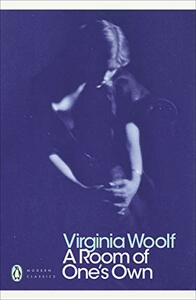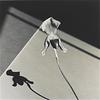You need to sign in or sign up before continuing.
Take a photo of a barcode or cover
Somehow I thought I’d read this in college, but I clearly hadn’t. Absolutely still relevant. Especially when you consider that Woolf’s predictions about what women’s writing will look like after 100 years of having “500 pounds a year and a room of one’s own” won’t be assessable for three more years. (She wrote this in 1928.)
inspiring
reflective
sad
fast-paced
reflective
medium-paced
inspiring
reflective
medium-paced
challenging
hopeful
reflective
sad
fast-paced
informative
reflective
fast-paced
slow-paced
inspiring
reflective
informative
inspiring
reflective
medium-paced
"By hook or by crook, I hope that you will possess yourselves of money enough to travel and to idle, to contemplate the future or the past of the world, to dream over books and loiter at street corners and let the line of thought dip deep into the stream."
I've been wanting to read this book for a very long time, but I was afraid that my up-and-down relationship with Virginia Woolf would once again be a down. I shouldn't have worried. In fact, this was one of the rare books that I wanted very much to underline as long as I read it.
This resonated with me as a woman who, in the XXIst century, still longs to have a room of my own, I've only had one for the first time in my life... since last year. Small, but mine. And crowded with books. I don't write, but it's my safe place : my desk, my computer, my books : heaven.
V. Woolf comes back to the fact that in her time, many, many writers, if not all, were men. She mentions Jane Austen, of course, the Brontës (well, Charlotte and Emily), and stresses that even them only had a small table to write and no place that belonged to only them. The Brontës wrote together on the dining room table, Jane Austen used to hide her writing time by pretending to write letters and counting on a creaking floorboard to warn her if anybody came near. All of them were usually interrupted by, well, life. They produced novels that are still famous, but how many women writers have we lost because they were not educated, they had to take care of their household, or they had to work for a living ? The Brontës had a thorough education but they were an exception. Women before them, and in their time, and after their time, were not usually given a real education, the opportunity to travel like men did, they didn't own their money if they had any, they were only there to make men's life better and more agreeable.
It's a short book, but it packs a punch. It has made me want to read more of her writings.
I've been wanting to read this book for a very long time, but I was afraid that my up-and-down relationship with Virginia Woolf would once again be a down. I shouldn't have worried. In fact, this was one of the rare books that I wanted very much to underline as long as I read it.
This resonated with me as a woman who, in the XXIst century, still longs to have a room of my own, I've only had one for the first time in my life... since last year. Small, but mine. And crowded with books. I don't write, but it's my safe place : my desk, my computer, my books : heaven.
V. Woolf comes back to the fact that in her time, many, many writers, if not all, were men. She mentions Jane Austen, of course, the Brontës (well, Charlotte and Emily), and stresses that even them only had a small table to write and no place that belonged to only them. The Brontës wrote together on the dining room table, Jane Austen used to hide her writing time by pretending to write letters and counting on a creaking floorboard to warn her if anybody came near. All of them were usually interrupted by, well, life. They produced novels that are still famous, but how many women writers have we lost because they were not educated, they had to take care of their household, or they had to work for a living ? The Brontës had a thorough education but they were an exception. Women before them, and in their time, and after their time, were not usually given a real education, the opportunity to travel like men did, they didn't own their money if they had any, they were only there to make men's life better and more agreeable.
It's a short book, but it packs a punch. It has made me want to read more of her writings.
informative
inspiring
reflective
medium-paced





